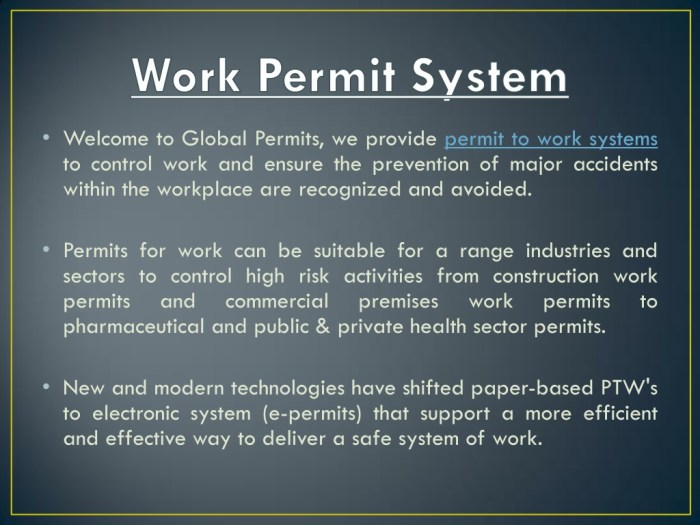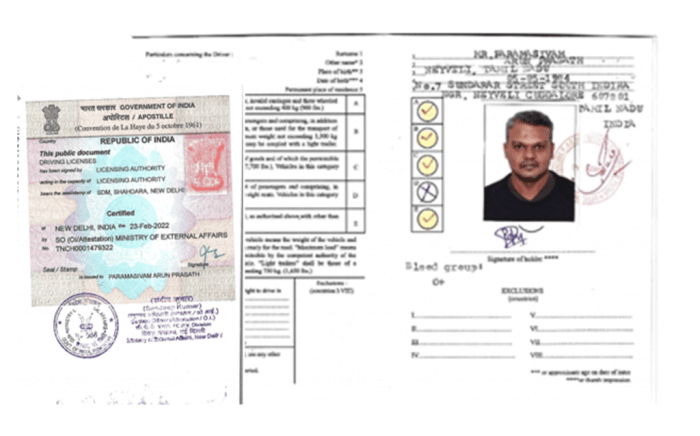Delving into the realm of global permit regulations, this guide aims to shed light on the intricate web of rules and requirements governing businesses worldwide. From navigating different permit application processes to understanding the impact on business operations, this exploration is essential for organizations seeking to operate on a global scale.
Overview of Global Permit Regulations

Understanding global permit regulations is crucial for businesses and organizations operating in multiple countries. These regulations govern the issuance and compliance of permits required for various activities, such as construction, import/export, environmental impact assessments, and more. By complying with global permit regulations, companies can ensure legal operations, avoid penalties, and maintain a positive reputation in the international market.
Key Differences between Local and Global Permit Regulations
Local permit regulations are specific to a particular country or region, dictating the rules and requirements for obtaining permits within that jurisdiction. On the other hand, global permit regulations set standards and guidelines that apply across multiple countries or regions, aiming to harmonize permit processes and ensure consistency in environmental protection, safety measures, and other aspects.
While local regulations may vary significantly, global regulations provide a common framework for businesses to navigate permit requirements in different locations.
- Local permit regulations are tailored to the specific laws and practices of a single country, while global permit regulations aim to create uniform standards that can be applied internationally.
- Global permit regulations often involve cooperation between multiple countries or international organizations to establish common guidelines and best practices.
- Local permit regulations may have stricter or more lenient requirements compared to global regulations, depending on the country's priorities and policies.
Industries or Sectors Affected by Global Permit Regulations
Various industries are impacted by global permit regulations, including but not limited to:
- Energy: Companies involved in oil and gas exploration, renewable energy projects, and nuclear power generation must adhere to global permit regulations to ensure environmental protection and safety.
- Manufacturing: Manufacturers of chemicals, pharmaceuticals, and consumer goods need permits to operate facilities and handle hazardous materials according to global standards.
- Transportation: Airlines, shipping companies, and logistics firms must comply with global permit regulations for routes, emissions, and safety measures to ensure smooth operations across borders.
- Construction: Builders and developers working on infrastructure projects in multiple countries must obtain permits that meet global standards for quality, safety, and environmental impact.
Common Global Permit Requirements
When it comes to obtaining global permits, there are certain common requirements that applicants need to fulfill. These requirements vary from country to country but generally include specific documentation and following a defined application process.
Documentation Needed for Obtaining Global Permits
- Valid passport
- Proof of residency
- Purpose of visit
- Letter of invitation (if applicable)
- Travel itinerary
- Proof of financial means
Process of Applying for Global Permits in Different Countries
It is important to research and understand the specific requirements and procedures for each country you plan to visit.
Generally, the process involves filling out an application form, submitting the required documentation, paying the necessary fees, and waiting for the permit to be processed. Some countries may require an interview as part of the application process.
Comparison of Permit Application Timelines in Various Regions
| Region | Average Processing Time |
|---|---|
| Europe | 2-4 weeks |
| North America | 4-6 weeks |
| Asia | 1-3 weeks |
| Africa | 4-8 weeks |
Challenges in Compliance with Global Permit Regulations
Ensuring compliance with global permit regulations can be a daunting task for organizations operating in multiple countries. The complexities involved in adhering to various sets of regulations often pose significant challenges.
Analyzing the Complexities of Adhering to Multiple Sets of Global Permit Regulations
When organizations operate in different countries, they must navigate through a maze of permit regulations that vary from one location to another. This can involve understanding diverse legal frameworks, language barriers, and cultural differences, making compliance a complex and multifaceted process.
Common Obstacles Faced by Organizations in Maintaining Compliance
- Lack of Awareness: Organizations may struggle to stay informed about the latest updates and changes in global permit regulations, leading to inadvertent violations.
- Resource Constraints: Limited budget and manpower can hinder the ability to effectively manage compliance with multiple permit requirements.
- Interpretation Challenges: Different interpretations of regulations by local authorities or stakeholders can create confusion and compliance issues.
- Monitoring and Reporting: Ensuring accurate monitoring and timely reporting of permit-related activities across various locations can be a logistical challenge.
Strategies for Overcoming Challenges in Global Permit Compliance
- Centralized Compliance Management: Implementing a centralized system for tracking and managing permit requirements can streamline the process and improve efficiency.
- Regular Training and Education: Providing ongoing training to employees on global permit regulations can enhance awareness and compliance adherence.
- Engagement with Local Experts: Collaborating with local consultants or legal experts can help organizations navigate the complexities of specific permit requirements in different regions.
- Investing in Technology: Utilizing compliance management software and tools can automate processes, facilitate reporting, and ensure accurate monitoring of permit-related activities.
Impact of Global Permit Regulations on Business Operations
Global permit regulations can have a significant impact on business operations, particularly in the areas of supply chains, logistics, financial implications, and decision-making processes within companies.
Supply Chains and Logistics
Global permit regulations can create bottlenecks in supply chains and logistics due to the need for ensuring compliance at each stage of the process. Delays in obtaining permits or dealing with regulatory issues can disrupt the flow of goods and services, leading to inefficiencies and increased costs.
Financial Implications of Non-Compliance
Non-compliance with global permit regulations can result in hefty fines, legal penalties, and reputational damage for businesses. Failure to adhere to permit requirements can also lead to delays in operations, loss of business opportunities, and increased expenses to rectify non-compliance issues.
Influence on Decision-Making Processes
Global permit regulations can influence decision-making processes within companies by impacting the choice of markets to operate in, the selection of suppliers and partners, and the allocation of resources for compliance purposes. Companies need to consider permit requirements when making strategic decisions to ensure smooth operations and avoid potential risks associated with non-compliance.
Trends and Future Outlook in Global Permit Regulations

Global permit regulations are constantly evolving to keep up with the changing landscape of industries and technologies. As we look towards the future, several trends are emerging that will shape the way companies navigate permit compliance and regulatory requirements.
Emerging Trends in Global Permit Regulations
- Increased focus on environmental sustainability: Many countries are implementing stricter permit regulations to promote sustainability and reduce the environmental impact of businesses.
- Digitalization of permit processes: Advancements in technology are streamlining permit applications and compliance monitoring, making it easier for companies to adhere to regulations.
- Harmonization of global standards: Efforts are being made to align permit regulations across different countries and regions to facilitate international business operations.
Impact of Technological Advancements on Permit Compliance
- Integration of AI and automation: Artificial intelligence and automation technologies are being utilized to enhance permit compliance processes, improving efficiency and accuracy.
- Data analytics for monitoring and reporting: Companies are leveraging data analytics tools to track compliance metrics and generate real-time reports for regulatory authorities.
- Blockchain for secure permit management: Blockchain technology is being explored to ensure the security and transparency of permit-related data and transactions.
Anticipated Changes in Global Permit Regulations
- Stricter enforcement of compliance: Regulatory bodies may increase enforcement measures to ensure companies adhere to permit regulations more diligently.
- Focus on emerging risks: Regulations may be updated to address new risks and challenges posed by evolving industries and technologies.
- Emphasis on stakeholder engagement: Permit regulations may require companies to engage with stakeholders more actively to ensure transparency and accountability in compliance efforts.
Closing Notes

Wrapping up our discussion on global permit regulations, it becomes evident that staying abreast of these regulations is crucial for businesses aiming to thrive in the international market. By understanding the challenges, requirements, and future trends, companies can adapt and excel in a rapidly evolving regulatory landscape.
FAQ Corner
What are the key differences between local and global permit regulations?
Local permit regulations are specific to a particular region or country, while global permit regulations encompass a broader scope, often requiring compliance with multiple sets of rules across different jurisdictions.
What kind of documentation is typically needed for obtaining global permits?
Commonly required documents for global permits include proof of identity, business registration certificates, project details, and environmental impact assessments, among others.
How can organizations overcome challenges in complying with global permit regulations?
Organizations can overcome compliance challenges by implementing robust tracking systems, conducting regular audits, staying informed about regulatory changes, and fostering a culture of compliance within the company.
















